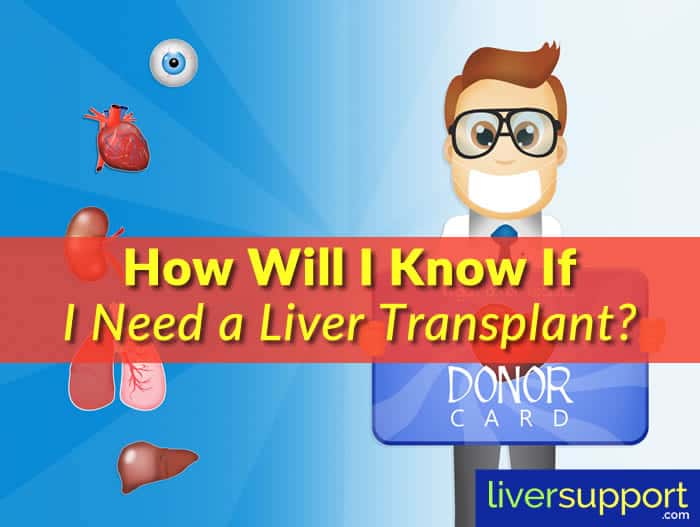
Previous
Foods to Avoid for Liver Health

Next
10 Liver Damage Symptoms That Could Be Trouble
How Will I Know If I Need a Liver Transplant?
Find out the signs of liver failure, as well as the factors that go into determining if someone is a good candidate for a liver transplant.
The liver is a vital organ and we cannot survive without one. That means that when the liver’s function is impaired due to infection, such as from hepatitis, from inflammation and scarring (cirrhosis), from chronic alcohol consumption or nonalcoholic fatty liver disease (NAFLD) – we may need a liver transplant. Currently, there are about 6,000 liver transplants performed in the U.S. each year.
Chronic and Acute Liver Failure
Often there is chronic liver failure which is also known as end-stage liver disease. This happens over months and even years as a liver disease or condition worsens over time. Chronic liver failure typically happens when the scarring from cirrhosis overtakes healthy liver tissue and the liver can no longer function sufficiently to maintain life.
Acute liver failure (ALF), also known as fulminant hepatic failure, is typically caused by drug-induced liver injury (DILI), a leading cause of ALF in the U.S. Other causes of liver failure include hepatitis infections, hemochromatosis (iron buildup in the liver), Wilson’s disease (copper buildup in the liver), and certain cancers.
Signs of Liver Failure
- Jaundice, a yellowing of the eyes and skin
- Unexplained fatigue
- Nausea
- Weight loss
- Bruising and bleeding with no clotting
- Black stools
- Dark urine
- Ascites, or fluid accumulation in the abdomen
- Swelling in the feet and ankles
Factors Physicians Consider for a Liver Transplant
When the liver fails, physicians will assess the patient for a liver transplant. Several factors are taken into consideration, including the status of the person’s liver disease, other conditions and diseases the patient has, the likelihood of surviving the transplant, the patient’s history of compliance with medical treatments and regimens, their mental and emotional health and support system.
If it is determined that the patient is eligible for a liver transplant, they are assigned a score based on urgency and are then placed on a national waiting list for an organ donor which is maintained by the United Network for Organ Sharing (UNOS), which oversees the U.S. Organ Procurement and Transplantation Network (OPTN). Critical patients who will likely die within a week are considered Status 1 Patients, and are given highest priority on the list. Sadly, 1 in 10 people waiting on the liver transplant list die while waiting for a new liver.
The Wait List
Scoring for the wait list is based on the Model for End-stage Liver Disease (MELD) and the Pediatric End-stage Liver Disease (PELD) which determines the likelihood of the patient dying within the next 90 days without a transplant. Scores are based on the results of blood tests which measure:
- Bilirubin – which determines the liver’s ability to filter this out of the blood
- Creatinine – which tests kidney function
- International Normalized Ratio (INR) – which tests blood clotting
Disqualifying Factors
A patient may be disqualified for a liver transplant based on several factors, including chronic alcohol or drug use, AIDS, cancers other than liver cancer, heart or lung diseases, or the inability to follow the medical regimen required to recover.
Family Members
Because a healthy liver can regenerate, sometimes a living family member is a match and can donate part of their healthy liver to a patient in need. Both the segment of liver left in the donor and the segment implanted in the recipient will then regrow to normal size. Typically, patients remain in the hospital for one to two weeks after liver transplant surgery to monitor for infection or rejection of the organ.
Risk of Rejection
There is significant risk involved in both receiving and transplanting a liver from a live donor. Most commonly, the recipient’s immune system may reject the liver. Rejection of the “foreign” organ typically happens within the first two weeks, and symptoms, if they are present, are typical of liver failure symptoms. Elevated liver enzymes detected in blood testing may be the only sign of rejection. Rejection is treated with immunosuppressive medications, which can have significant side effects.
It is important that those who have a liver transplant follow a physician’s instructions about medication and diet in order to minimize risk of rejection and maintain the health of the new liver.
If you would like to donate your liver or other vital organs, go to www.organdonor.gov to learn how.
American Liver Foundation. (2016). Liver transplant. American Liver Foundation. Retrieved on 10/25/16 from http://www.liverfoundation.org/abouttheliver/info/transplant/.
Cherney, K. (2013). The facts about liver transplant: Survival rates, statistics, and more. Healthline. Retrieved on 10/25/16 from http://www.healthline.com/health-slideshow/liver-transplant.
NIH. (2016). Liver transplant. National Institute of Diabetes and Digestive and Kidney Diseases. Retrieved on 10/25/16 from https://www.niddk.nih.gov/health-information/health-topics/liver-disease/liver-transplant/Pages/facts.aspx.






